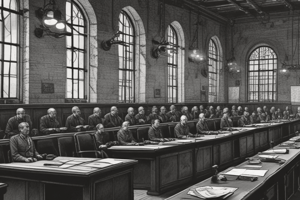Podcast
Questions and Answers
The Nuremberg Trials were held in a country other than Germany.
The Nuremberg Trials were held in a country other than Germany.
False (B)
The main indictments against the defendants included crimes against animals.
The main indictments against the defendants included crimes against animals.
False (B)
The Nuremberg Trials rejected the idea that only men could be found guilty of crimes of international law.
The Nuremberg Trials rejected the idea that only men could be found guilty of crimes of international law.
True (A)
The Nuremberg Trials only established new principles of international law for Germany.
The Nuremberg Trials only established new principles of international law for Germany.
The United States was not involved in the Nuremberg Trials.
The United States was not involved in the Nuremberg Trials.
Flashcards are hidden until you start studying
Study Notes
Nuremberg Trials
- The Nuremberg trials were unprecedented in their uniform judicial system, targeting criminal high officials such as Nazi leaders.
- The main leaders of this judicial system were Great Britain, The Soviet Union, and The United States.
Reasons for Delayed Trials
- The trials only began after the war ended due to limited resources on the Allies' side and fear that if word about the trials being planned got out, the Nazis would commit worse atrocities to cover their tracks.
Trial Outcomes
- 177 people were accused of committing war crimes, and 97 were convicted.
- More than 900 trials took place for World War 2 criminals.
Nazi Atrocities
- During their 12 years in power from 1933-1945, the Nazis authorized and encouraged brutal and gruesome atrocities against people based on their personal values and beliefs.
- About 6 million Jews were killed and tortured in labor and death camps.
- Other notable victims include homosexuals, communists, and Roma.
- It is estimated that around 12 million innocent lives were lost as a result of the Holocaust.
Defenses and Convictions
- Many defendants argued that the judges didn't have the right to pass judgment upon them in Germany.
- Hundreds of criminals were brought to justice for their actions, helping the fight against genocide in the world.
International Law and Principles
- The trials established new principles of international law, including the rejection of chief defenses for the defendants.
- The trials also rejected the idea that only a state could be found guilty for the level of criminality committed, instead holding individuals accountable and giving just punishment.
- Crimes of international laws could be committed by both men and women, and only by holding individuals accountable for their actions and crimes could those international laws be enforced.
Indictments and Countries Involved
- The specific indictments against the defendants were: crimes against peace, crimes against humanity, war crimes, and conspiracy to commit any or all criminal acts.
- The main countries involved with the Nuremberg Trials were the Soviet Union, France, The United Kingdom, and The United States.
Lasting Impact
- The trials created a strong precedent for subsequent war crimes trials relating to World War 2 as well as any future conflicts.
- Policies enforced and created during the trials were used internationally in the future as well as specifically in the US in later criminal cases.
- There was a significant promotion of a united judicial system in case a global genocide were to occur again, and laws were created in the US to prevent persecution of individuals based on factors such as belief, sex, race, etc.
Studying That Suits You
Use AI to generate personalized quizzes and flashcards to suit your learning preferences.




